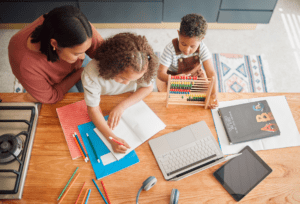Nurture Social Skills in Autistic Children
Navigating the complex world of social skills can be challenging for any child, but for children with autism, these challenges can be even more pronounced. Autism spectrum disorder (ASD) affects how children perceive and interact with the world around them, often making social interactions overwhelming and confusing. This blog post aims to provide parents and autism support communities with valuable insights and practical strategies to nurture social skills in autistic children. From early intervention to community resources, we will explore various ways to support and empower these children on their unique journeys.
Understanding Social Skills in Autism
Autistic children often face unique challenges when it comes to social skills. These can include difficulties in understanding social cues, maintaining eye contact, and engaging in reciprocal conversations. For many children with autism, interpreting facial expressions and body language does not come naturally, which can lead to misunderstandings and social isolation. Understanding these challenges is the first step in helping them overcome these social hurdles.
Communication Barriers
Autistic children may struggle with both verbal and non-verbal communication. This includes challenges in initiating conversations, staying on topic, or even responding appropriately to social interactions. These barriers can make it difficult for them to build and maintain relationships with peers.
Cognitive Differences
The cognitive processes of autistic children are often different from neurotypical children. This can affect their ability to understand and predict the behaviors of others, leading to social misunderstandings. Recognizing this difference is crucial in tailoring supportive strategies that cater to their unique needs.
Sensory Sensitivities
Many children with autism experience sensory sensitivities, which can make social environments overwhelming. Loud noises, bright lights, or even certain textures can be distressing, further complicating their ability to engage socially. Addressing these sensitivities is an essential component of social skills development.
Importance of Early Intervention

Early intervention plays a pivotal role in the social skills development of autistic children. Research shows that the earlier these interventions begin, the more significant the impact on the child’s ability to communicate and interact socially.
Learn more about testing and diagnosis: https://www.littlestaraba.org/for-families/testing-and-diagnoses/
Long-term Benefits
Early intervention can lead to improved social interactions, better academic performance, and increased independence. By addressing social skills challenges early on, children are better equipped to handle the complexities of social interactions as they grow.
Parental Involvement
Parents play a critical role in early intervention. Their active participation in therapy sessions and at-home practice can significantly enhance the effectiveness of social skills training. Encouraging parents to engage fully in the process is vital for sustained progress.
Professional Guidance
Working with professionals who specialize in autism therapy, such as Applied Behavior Analysis (ABA) therapists, can provide tailored strategies that address the specific needs of each child. These experts can offer guidance and support to both the child and their family, ensuring a comprehensive approach to social skills development.
Strategies for Social Skills Development
Developing social skills in autistic children requires a thoughtful and individualized approach. Here are some practical strategies for parents to consider:
Create a Structured Environment
A structured environment can help autistic children feel more secure and understand what is expected of them in social situations. Visual schedules, clear routines, and consistent rules can provide the predictability they need to thrive.
Use Social Stories
Social stories are personalized short stories that depict social situations and appropriate responses. These stories can help children understand and practice social interactions in a safe and controlled manner. Social stories can be particularly effective in teaching specific skills such as greeting others, sharing, and taking turns.
Encourage Play-Based Learning
Play is a natural way for children to learn social skills. Encourage cooperative play activities that require teamwork and communication. Simple games that involve taking turns, sharing, and following instructions can be both fun and educational.
Community Support and Resources

Accessing the right support and resources can make a significant difference in the social skills development of autistic children.
We have a collection of resources to help you: https://www.littlestaraba.org/resources
Here are some avenues for support:
Support Groups
Joining a support group can provide parents with a sense of community and shared experience. These groups offer a space to share challenges, successes, and strategies with other parents who understand the unique joys and struggles of raising an autistic child.
Educational Resources
There are numerous educational resources available to help parents and caregivers support their child’s social skills development. Books, online courses, and workshops can provide valuable information and practical tips. Websites like the Autism Society and Autism Speaks offer a wealth of resources tailored to different aspects of autism support.
Therapies and Services
Various therapies and services can support social skills development. Applied Behavior Analysis (ABA) therapy is widely recognized for its effectiveness in improving communication and social skills in autistic children. Other therapies, such as speech therapy and occupational therapy, can also play a crucial role in enhancing social interactions.
Social skills development is a vital aspect of supporting autistic children in leading fulfilling and connected lives. By understanding their unique challenges, implementing early interventions, and utilizing effective strategies, parents and caregivers can make a significant impact on their child’s social abilities. Remember, you are not alone on this journey. Reach out to support groups, educational resources, and professional services to find the help and guidance you need. We encourage you to share your experiences and tips with our community, as together, we can create a supportive and inclusive environment for all.
For more information, tips, and support, feel free to explore our resources and connect with our dedicated team. Together, we can make a positive difference in the lives of autistic children and their families. Call or Email one your local LittleStar office today to get started on your journey with us.
Here is some frequently asked questions about LittleStar: https://www.littlestaraba.org/for-families/faq/
Real Care. Real Advocacy. Real Progress.
LittleStar is a special place for those impacted by autism, with Indiana centers staffed by experienced professionals providing ABA therapy. Our clean, safe facilities are dedicated to improving lives, backed by a non-profit model and a national advisory board of autism experts. We prioritize individual goals, ensure highly qualified team members, and strive to inspire, serve, and guide those affected by autism to a better reality. Our goal is to be a trusted, innovative partner, offering compassionate support and creating new possibilities for individuals with autism throughout their lives.
Follow along with us on Facebook and Instagram as we inspire, serve, and guide all those touched by autism to achieve a better reality.



